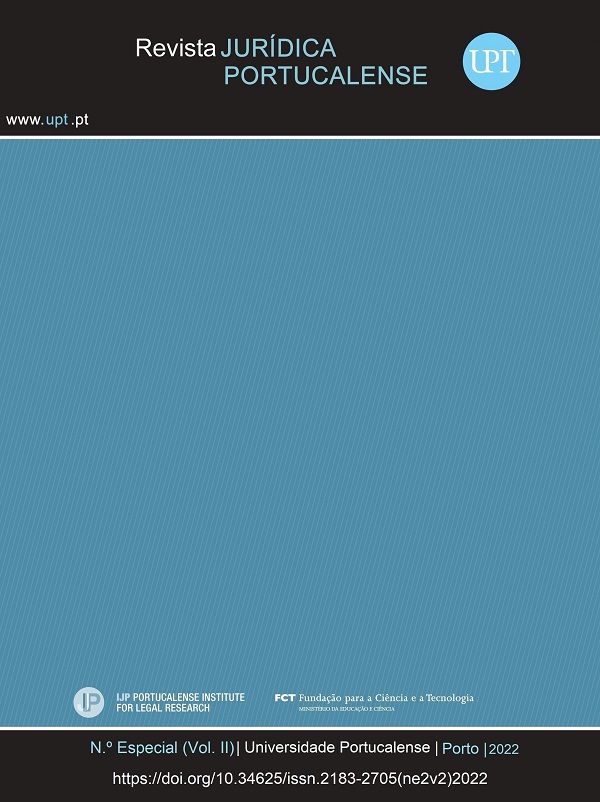The Challenge of the Regulation of Artificial Intelligence in the Judicial System and its Environment
Keywords:
Artificial Intelligence; Justice; Algorithms; Regulation; Justice Ecosystem; Right to an effective remedy.Abstract
The present work seeks to analyse the most appropriate form of the legal regulation of the process of implementation of artificial intelligence in the Administration of Justice and its environment. To do this, it examines the concept of the justice ecosystem and analyses the regulatory proposals currently underway in the European Union, seeking to establish the appropriate legal framework for the intended purposes, capable of guaranteeing respect for fundamental rights, especially the right to an effective remedy and the requirements of the principle of legality.
References
ARENDT, Hannah. La condición humana. Ed. Paidós. 2016.
BARONA VILAR, Silvia. Algoritmización de la Justicia y del Derecho. De la inteligencia artificial a la Smart justice. Ed. Tirant, Valencia, 2021.
______. Inteligencia artificial o la algoritmización de la vida y de la justicia: ¿solución o problema? Revista Boliviana de Derecho, ISSN-e 2070-8157, Nº. 28, 2019, págs. 18-49.
BUJOSA VADELL, Lorenzo-Mateo. PALOMO VÉLEZ, Diego. “Mediación Electrónica: perspectiva europea”. Revista Ius et Praxis, Año 23, Nº 2, 2017, p. 52.
CANALES ALIENDE, José Manuel. “El servicio público de la justicia: actualidad y perspectivas”. Cuadernos Política y Sociedad. N.º 20. Madrid, pp. 63-70.
CASTELLS, Manuel. La sociedad red. Alianza Editorial. Madrid: 1997, p. 88.
COUTURE, Eduardo. Introducción al estudio del proceso civil. Ed Depalma, Buenos Aires, 1978, p. 17.
DESMOULIN-CANSELIER, Sonia; LE MÉTAYER, Daniel. “Algorithmic Decision Systems in the Health and Justice Sectors: Certification and Explanations for Algorithms in European and French Law”. European Journal of Law and Technology, 2018, vol. 9, no 3, p. 12.
DIZ, Fernando Martín. “Del derecho a la tutela judicial efectiva hacia el derecho a una tutela efectiva de la justicia”. Revista europea de derechos fundamentales, 2014, no 23, p. 161-176.
FERGUSON, Andrew. “Policing Predictive Policing”. Wasington University Law Review, n.º 94. Whashington, 2017. p.1109. Dispoible en: https://openscholarship.wustl.edu/law_lawreview/vol94/iss5/5. Aceso en 10/01/2021.
FOUCAULT, Michel. Vigilar y castigar. Ed. Biblioteca Nueva. Madrid, 2012.
GÓMEZ CASTILLA, Santiago. Transcendiendo a un ecosistema de justicia y cultura. Proyecto arquitectónico de un ecosistema de justicia. Universidad de los Andes, Bogotá, 2019.
LÓPEZ GUERRA, Luis. La modernización de la justicia como servicio público. Revista de Derecho Político, 2000, no 47, pp. 11-26.
HEIDEGGER, Martin. Carta sobre el humanismo. Ed. Alianza. Madrid, 2000.p. 3.
______. “La justicia como derecho ciudadano: algunas cuestiones actuales”. “La justicia como derecho ciudadano. Algunas cuestiones actuales”. Nuevas Políticas Públicas: Anuario multidisciplinar para la modernización de las Administraciones Públicas, N.º 5, 2009, pp. 31-32.
SCHWAB, Klaus. La cuarta revolución industrial. Ed. Debate, 4ª Ed. Barcelona, 2018, pp. 13 y ss.
SUÁREZ XAVIER, Paulo Ramón. Gobernanza, Inteligencia Artificial y Justicia Predictiva: Los retos de la Administración de Justicia ante la Sociedad en Red. Tesis doctoral. Universidad de Málaga, 2020, p. 400.
______. Transformación Digital de la Administración de Justicia: viejos paradigmas, nuevos horizontes. Ed. Colex, A Coruña, 2021.
SUSSKIND, Richard; SUSSKIND, Daniel. El futuro de las profesiones: cómo la tecnología transformará el trabajo de los expertos humanos. Oxford University Press, Estados Unidos, 2015.
WALLERSTEIN, Immanuel. Conocer el mundo, saber el mundo. Ed. Siglo XXI. 2ª Ed. 2002, Buenos Aires, p. 140.
Downloads
Published
How to Cite
Issue
Section
License
Authors who published in the journal agree to the following terms:
- The Authors grant the Journal the right of first publication, and other non-exclusive publishing rights, licensed under the Creative Commons Attribution License which allows the sharing of work with recognition of its initial publication in this journal.
- Authors are able to take on additional contracts separately, non-exclusive distribution of the version of the paper published in this journal (ex .: publish in an institutional repository or as a chapter in a book), with an acknowledgement of its initial publication in this journal.
- Authors are permitted and encouraged to post and distribute their work online (eg .: in institutional repositories or on their website) at any point before or during the submission process, as it can lead to productive exchanges, as well as increase the impact and the citation of published work (See The Effect of Open Access).
RJP does not apply submission, publication or any other fees of any nature. Its articles are open access, with the goal of disseminating scientific knowledge and the debate of legal topics in the area of Legal Sciences.






